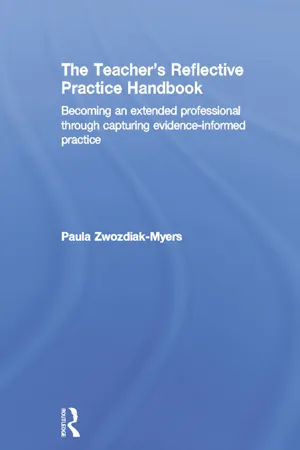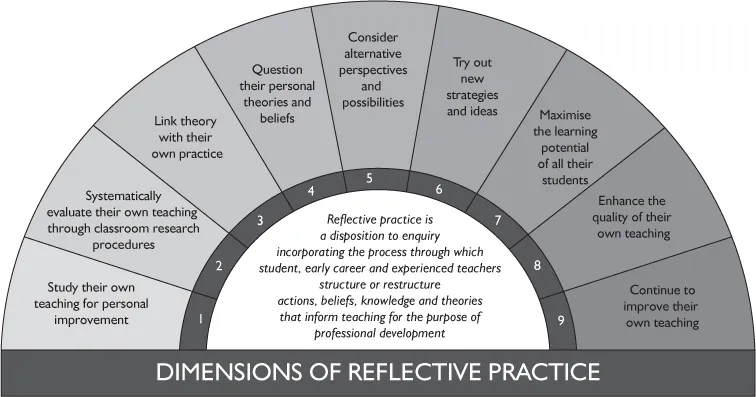![]()
Part I
Reflective practice for professional development
Framing the construct
![]()
Chapter 1
Reflective practice
Captured, framed and defined
Learning objectives
In this chapter you will consider:
• how reflective practice as a disposition to enquiry and a process has been interpreted within the Framework of Reflective Practice;
• how reflective attitudes can influence your approach to teaching;
• key characteristics and attributes used to describe extended professionals;
• central concepts associated with defining the teacher as a professional;
• how emotional intelligence and professional values may be reflected in your teaching.
Introduction
In recent decades, reflective practice has increasingly become embedded within discourse concerning teacher professional development, particularly in relation to raising educational standards, performance management and whole-school improvement planning. Teachers who ask searching questions about educational practice that arise from their own contexts and professional concerns demonstrate a commitment to continuous learning by seeking new ideas, evaluating and reflecting on their impact, and trying out new ways of working to improve their effectiveness. This approach to professional development underpins concepts of the teacher as a reflective practitioner, a researcher and an extended professional. These concepts are interrelated as Stenhouse (1975) argues, the outstanding feature of extended professionals is their capacity and commitment to engage in autonomous self-development through systematic self-study, reflection and research.
Central to your development as a teacher is your commitment and capacity to analyse and evaluate what is happening in your own lessons and to use your professional judgement both to reflect and act upon these analyses and evaluations to improve pupil learning and the quality of your teaching. This enables you to make informed judgements derived from an evidence base about the effectiveness of both.
Although reflective practice is a complex, multifaceted phenomenon, it is important that you gain an insight and understanding of its core components as each component plays a significant role in your on-going professional development. The purpose of this chapter is to demystify this phenomenon and, in so doing, open your eyes to the numerous factors and variables that may influence and impact the quality of your teaching. This should enable you to exercise greater discernment in making professional judgements about how and in what areas you need further development so as to maximise the learning opportunities you provide for all your pupils from a well-informed platform.
To that end, the Framework of Reflective Practice, designed to capture nine dimensions of reflective practice in which teachers can demonstrate capacity and commitment as they engage in research to study and improve their own teaching, is presented here. The Framework, with its definition and associated dimensions of reflective practice, provides you with specific focal points to guide and structure evidence-informed practice.
Reflective practice for professional development
Figure 1.1 illustrates the Framework of Reflective Practice (Zwozdiak-Myers, 2010) based around nine dimensions, which have been identified through a synthesis of the literature on reflective practice advanced by eminent scholars, researchers and practitioners within the field. The key attributes associated with reflective attitudes (Dewey, 1933), extended professionals (Hoyle, 1974; Stenhouse, 1975) and the teacher as a professional (Day, 1999; Eraut, 1994; Hoyle and John, 1995) are particularly significant as these have resonance with the central features used to characterise the teacher as researcher (Hopkins, 2002; Stenhouse, 1975). This construct supports Moore’s (2000: 146) proposition that teachers should perceive themselves ‘as researchers and theorists as well as practitioners’ as the pursuit of becoming a reflective practitioner is not so much about the acquisition or development per se of the skills and areas of knowledge required for successful teaching, but rather concerns ‘the particular skills needed to reflect constructively upon on-going experience as a way of developing those skills and knowledge and improving the effectiveness of one’s work’ (ibid.: 128).
Although the dimensions presented in Figure 1.1 might not appear to have well-defined boundaries given the complex, interdependent nature of variables that abound within the context of teaching and learning, they have been separated out to map the salient features embedded within each, in relation to the development of reflective practice. It is important to note that although the dimensions are presented in a linear, sequential manner from 1 through 9, any one dimension can provide the initial catalyst for reflective practice. For example, a debriefing session with a mentor or professional tutor following an observation of your lesson might through discussion provide the springboard from which you consider alternative perspectives and possibilities (dimension 5) for future lessons, or you might decide to attend a specific training session offered by your local authority or subject association to continue to improve your own teaching (dimension 9). Following the initial impetus to engage in reflective activity, other dimensions will come into play; ultimately they all interrelate and each forms an integral part of the construct. The picture should begin to emerge as a coherent whole.
Figure 1.1 Framework of reflective practice
Situated at the core of this framework, reflective practice is defined as:
a disposition to enquiry incorporating the process through which student, early career and experienced teachers structure or restructure actions, beliefs, knowledge and theories that inform teaching for the purpose of professional development.
Two very broad, interrelated strands – a disposition to enquiry and a process – are embedded within this definition. Ways in which the work of key proponents within the field contribute toward an understanding of the characteristic features associated with the first strand are identified in the following sub-sections of this chapter.
The second strand, which captures reflective practice as a process, incorporates numerous concepts advanced by theorists over past decades, particularly in relation to the nature of reflective activity and its translation into professional practice. The seminal work of Schon (1987) and his concepts of reflection in action and reflection on action along with Kolb’s (1984) model of experiential learning are but two examples. Although some of these processes are inextricably linked to a disposition to enquiry and are briefly touched upon here, Chapters 3 through 11 explore the main concepts and theories used to clarify the range of processes embedded within each dimension of reflective practice highlighted in Figure 1.1.
Reflective practice as a disposition to enquiry
Reflective attitudes
Reflective practice as a disposition to enquiry has at its roots the early work of Dewey (1933), specifically in relation to the reflective attitudes of open-mindedness, responsibility and wholeheartedness, which he considers to be both prerequisite and integral to reflective action.
Open-mindedness refers to the willingness to consider more than one side of an argument and fully embrace and attend to alternative possibilities, which requires an active desire to listen to more than one side and recognise that formerly held views and beliefs could be misconceived. Reflective teachers question and challenge why they do as they do (Zeichner and Liston, 1996) by interrogating assumptions, beliefs and personal theories from a range of perspectives or lenses (Brookfield, 1995), which can be evidenced in those who are open to scrutiny and change.
Responsibility refers to the disposition to carefully consider the consequences of actions and willingness to accept those consequences. Dewey (1933: 32) argues that misconceptions and confusion can arise when individuals ‘profess certain beliefs [yet] are unwilling to commit themselves to the consequences that flow from them’. Teachers who evaluate their own practice and question whether the outcomes are effective, for whom and in what ways, as opposed to those who merely question whether their objectives have been met (Zeichner and Liston, 1996), demonstrate responsibility.
Wholeheartedness refers to the way in which open-mindedness and responsibility come together, through an interest in and enthusiasm for some situation or event. Whole-hearted teachers examine their assumptions, beliefs and the consequences of their actions regularly and approach each situation with a view to learning something new (Zeichner and Liston, 1996). As Dewey (1933: 30) writes:
a genuine enthusiasm is an attitude that operates as an intellectual force. When a person is absorbed, the subject carries him on. Questions occur to him spontaneously; a flood of suggestions … further inquiries and readings are indicated and followed … the material holds and buoys his mind up and gives an onward impetus to thinking.
Very clear links can be drawn between Dewey’s exposition of reflective attitudes and assuming responsibility for your own professional development, which has been positioned as a central feature in Zeichner and Liston’s (1996: 6) idea of a reflective teacher: ‘when embracing the concept of reflective teaching, there is often a commitment by teachers to internalise the disposition and skills to study their teaching and become better at teaching over time, a commitment to take responsibility for their own professional development’.
Extended professionals
Several theorists built upon Dewey’s discourse of reflective attitudes. The early work of Hoyle (1974) gave rise to the distinction between restricted and extended professionals. Characteristics used to describe restricted professionals include: a high level of skill in classroom practice; an ability to understand, establish and enjoy positive working relationships with children by adopting a child-centred approach; the use of personal perceptions of change in pupil behaviour and achievement to evaluate performance; and short-term practical course attendance. Characteristics used to describe extended professionals incorporate all those associated with restricted professionals in addition to the following:
• contextualising classroom practice by relating it to the wider contexts of school, community and society;
• participating in a wide range of professional development activities such as conferences, subject panels and in-service educational training;
• an active concern to link theory and practice;
• engagement in peer observation and small-scale collaborative research studies.
Reflective task 1.1 Reflective attitudes
Distinctions drawn by Gore (1993) between recalcitrant, acquiescent and committed student teachers in terms of their disposition to think, talk and write about their experiences as learners and as teachers, illustrate the significance of Dewey’s reflective attitudes. Similarly, based upon evidence o...

